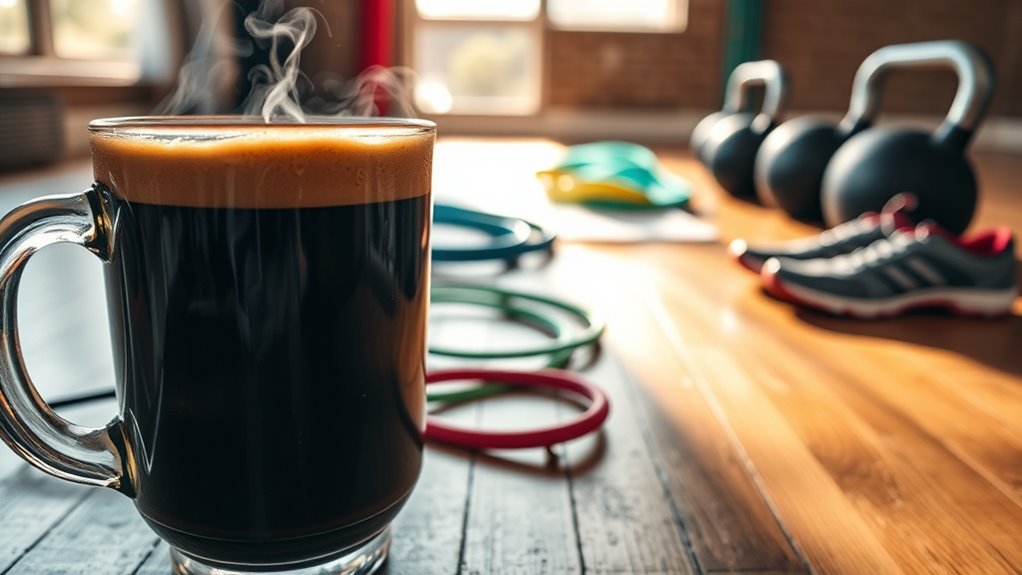The Ultimate Guide to Coffee and Workout Performance
Caffeine can be a game-changer for your workout performance. It enhances endurance, boosts focus, and improves recovery by reducing muscle soreness. For ideal results, consume 3-6 mg of caffeine per kilogram of body weight 30-60 minutes before your workout. Choosing dark roast coffee is beneficial due to its higher antioxidant levels. Just remember to stay hydrated and monitor your caffeine sensitivity. There’s much more to discover about customizing your coffee intake for peak performance.
The Science of Caffeine: How It Affects Your Body

When you consume caffeine, it doesn’t just perk you up; it triggers a series of physiological responses that can enhance your workout performance. Caffeine metabolism varies from person to person, influencing how quickly it affects you. Some folks feel the effects almost immediately, while others may take longer to notice. This variability in individual responses means you should experiment with timing and dosage to find what works best for you. Aim for a moderate intake of about 3-6 mg per kilogram of body weight, consumed about 30-60 minutes before your workout. By understanding how caffeine interacts with your body, you can harness its benefits, boosting endurance and focus while enjoying the freedom to personalize your fitness routine.
The Benefits of Caffeine for Endurance Athletes
As you endeavor to enhance your endurance, incorporating caffeine into your pre-workout routine can be a game changer. Caffeine can greatly improve your performance by boosting your energy and reducing perceived exertion. Understanding caffeine metabolism is key, as its effects can vary based on individual tolerance and timing. Here are some ways caffeine can enhance your endurance strategies:
- Increased stamina: Helps you push through long workouts.
- Improved focus: Keeps your mind sharp during those tough miles.
- Faster recovery: Aids in reducing muscle soreness post-exercise.
- Fat utilization: Enhances your body’s ability to use fat as fuel, preserving glycogen stores.
Incorporating caffeine smartly can release your full potential and elevate your endurance performance to new heights.
Caffeine and Strength Training: A Performance Booster

While many associate caffeine primarily with endurance sports, its benefits extend significantly into the domain of strength training. Caffeine can enhance your performance by improving muscle contraction and reducing perceived effort, allowing you to push harder during your lifts. Research shows that caffeine metabolism can lead to increased strength adaptations, meaning you might see better results from your training sessions. To maximize these effects, consider consuming caffeine about 30-60 minutes before your workout. This timing can optimize its benefits, helping you lift heavier and perform more reps. Just remember, moderation is key—too much caffeine can lead to jitters or decreased focus. With the right approach, caffeine can be a powerful ally in your strength training journey.
Timing Your Coffee: When to Brew for Optimal Results
Caffeine’s role in enhancing workout performance isn’t just about the amount you consume; it’s also about timing your intake for maximum effect. To guarantee you’re reaping the benefits of your coffee brewing, consider these tips for ideal consumption:
- Brew 30-60 minutes before your workout: This timing allows caffeine to reach peak levels in your bloodstream.
- Avoid late-day coffee: Consuming caffeine too close to bedtime can disrupt sleep, which is essential for recovery.
- Experiment with different types: Find what works best for you, whether it’s espresso, cold brew, or a classic drip.
- Stay hydrated: Pair your coffee with water to avoid dehydration and maximize performance.
The Best Types of Coffee for Workout Performance

Choosing the right type of coffee can greatly impact your workout performance, especially when you consider its nutritional benefits. For a quick energy boost, espresso shots are a fantastic choice. They’re concentrated, providing caffeine that enhances focus and endurance. Just one or two shots can elevate your performance without weighing you down.
Alternatively, cold brew is another excellent option. It’s less acidic and easier on the stomach, making it a great pre-workout drink for those who might experience jitters or discomfort from traditional coffee. Cold brew’s smooth flavor can also encourage you to hydrate better, which is vital for peak performance. Ultimately, whether you prefer espresso or cold brew, both can be powerful allies in achieving your fitness goals.
Coffee vs. Caffeine Supplements: What You Need to Know
When considering your pre-workout boost, you might wonder whether coffee or caffeine supplements are better for you. Natural coffee offers a blend of nutrients, while synthetic supplements can provide a more concentrated dose. Understanding the differences in dosage, effectiveness, and timing for each option can help you optimize your workout performance.
Natural vs. Synthetic Sources
While both coffee and caffeine supplements can enhance workout performance, understanding their differences can help you make an informed choice. Here’s what you should consider when comparing natural caffeine from coffee to synthetic caffeine from supplements:
- Nutritional benefits: Coffee contains antioxidants and other beneficial compounds that support overall health.
- Absorption rates: Natural caffeine may be absorbed more slowly, providing a steadier energy boost.
- Side effects: Synthetic caffeine can lead to jitters or increased heart rate, especially in high doses.
- Convenience: Caffeine supplements are portable and easy to consume, while coffee requires preparation.
Ultimately, whether you choose natural or synthetic sources, know your body and how each affects your performance to optimize your workout.
Dosage and Effectiveness
Understanding how dosage affects effectiveness is key to maximizing your workout performance, whether you opt for coffee or caffeine supplements. The right caffeine dosage can enhance endurance and strength, but effectiveness variations exist between individuals. Generally, 3-6 mg of caffeine per kilogram of body weight is effective for most. If you choose coffee, consider the amount of caffeine per cup, which varies widely. Supplements often provide a more controlled dosage, ensuring you get the desired boost without the extra calories. However, personal tolerance plays a significant role; some may experience jitters or anxiety with higher doses. Experimenting with different sources and dosages can help you find what works best for your unique workout routine, allowing you to seize your fitness goals with freedom.
Timing for Optimal Results
To achieve ideal workout performance, knowing when to consume caffeine—whether from coffee or supplements—can make a significant difference. Timing your caffeine intake is essential for maximizing its benefits during your pre workout rituals and enhancing post workout recovery. Here are some key points to take into account:
- 30-60 minutes before your workout: This is the sweet spot for caffeine to take effect.
- Experiment with dosage: Find the right amount that boosts your energy without causing jitters.
- Reflect on your workout type: Endurance sessions may benefit from caffeine, whereas strength training might require a different approach.
- Hydrate: Caffeine can be dehydrating, so make sure you’re drinking enough water.
Understanding Caffeine Tolerance and Its Impact
You might notice that your response to caffeine changes over time, which is largely due to variations in caffeine sensitivity and tolerance development. As you regularly consume caffeine, your body adapts, potentially diminishing its performance-boosting effects. Understanding your personal tolerance can help you optimize your caffeine intake for better workout results.
Caffeine Sensitivity Variations
While caffeine is widely recognized for its performance-enhancing benefits, individual responses can vary considerably due to differences in caffeine sensitivity. This variation often stems from caffeine genetics and how your body metabolizes caffeine. Understanding your unique response can help you optimize your workout.
Consider these factors that may affect your caffeine sensitivity:
- Genetics: Your genes influence how quickly you metabolize caffeine.
- Body Weight: Heavier individuals may require more caffeine for the same effects.
- Age: Sensitivity may change as you age, affecting caffeine’s impact.
- Diet: Other nutrients can interact with caffeine, altering its effects.
Tolerance Development Over Time
As you become more familiar with caffeine’s effects, it’s important to recognize that tolerance can develop over time. Regular use can lead to diminished responsiveness, meaning you might need more to achieve the same energy boost. This can result in performance fluctuations during workouts, as your body adapts. If you suddenly cut back, you might experience caffeine withdrawal, including headaches and fatigue, which can further hinder your performance. To maintain ideal benefits, consider cycling your caffeine intake—take breaks or reduce consumption periodically. This can help reset your tolerance, ensuring you get the most from your pre-workout coffee. Remember, balance is key; staying mindful of your body’s reactions will empower you to harness caffeine’s benefits effectively.
Hydration and Coffee: Balancing Your Intake

To maintain ideal hydration during workouts, it’s crucial to balance coffee intake with sufficient water consumption. While coffee can enhance performance, it may also lead to dehydration if not managed properly. Here are some hydration strategies to reflect on with your coffee consumption:
- Drink water before and after coffee to offset any dehydrating effects.
- Limit coffee intake to one or two cups, especially before intense workouts.
- Monitor your body’s signals for thirst and adjust your water intake accordingly.
- Include hydrating foods like fruits and veggies in your diet to support overall hydration.
Tips for Incorporating Coffee Into Your Workout Routine
Balancing hydration is just one part of effectively integrating coffee into your workout routine. Start by choosing the right coffee types; dark roasts generally have higher antioxidant levels, which can enhance performance. Experiment with various brewing methods, like pour-over or French press, to find what suits your taste and gives you the energy boost you need. Aim to consume coffee about 30-60 minutes before your workout for ideal benefits. Keep an eye on portion sizes; 1-2 cups should suffice to avoid jitters. Also, remember to hydrate adequately, as caffeine can be dehydrating. Finally, listen to your body—if you feel too wired, consider reducing your intake. Enjoy the freedom of customizing your coffee experience while enhancing your workouts!
Frequently Asked Questions
Can Coffee Improve Mental Focus During Workouts?
Imagine you’re a knight preparing for battle, armed with the right tools. Just like that, coffee can sharpen your focus during workouts. With its caffeine benefits, it boosts your workout concentration, helping you stay on task and push through tough sets. Studies show that caffeine enhances cognitive performance, allowing you to stay mentally sharp. So, if you’re looking for that extra edge in your routine, a cup of coffee might be just what you need.
How Much Coffee Is Too Much Before Exercising?
When it comes to how much coffee is too much before exercising, it really depends on your caffeine tolerance. For most people, an ideal dosage is around 3 to 6 mg of caffeine per kilogram of body weight, which can enhance performance without causing jitters. If you’re new to caffeine, start on the lower end. Listen to your body; if you feel anxious or jittery, it’s a sign you’ve had too much.
Does Coffee Affect Sleep Quality After Workouts?
Yes, coffee can affect your sleep quality after workouts, especially if consumed too close to bedtime. Caffeine metabolism varies among individuals, with some processing it faster than others. If you’re sensitive to caffeine, it might disrupt your sleep duration, leading to restless nights. To guarantee ideal recovery, consider limiting coffee intake to earlier in the day. This way, you can enjoy your workouts without sacrificing restorative sleep later on.
Are There Any Downsides to Coffee Consumption?
There are definitely some downsides to coffee consumption that you should consider. For one, excessive intake can lead to dehydration risks, especially if you’re not balancing it with water. Also, over time, you might develop caffeine tolerance, meaning you’ll need more to achieve the same stimulating effects. It’s essential to enjoy coffee mindfully and stay aware of how it affects your body, so you can maintain that freedom in your daily routine.
Can Decaf Coffee Provide Workout Benefits?
Did you know that about 30% of coffee drinkers prefer decaf? While it may lack the caffeine kick, decaf can still provide notable benefits for your workout performance. It contains antioxidants that can help reduce inflammation and improve recovery. Plus, its hydration factor can keep you feeling refreshed during your sessions. So, if you’re sensitive to caffeine, don’t hesitate to enjoy decaf; it’s a viable option for enhancing your fitness routine!






